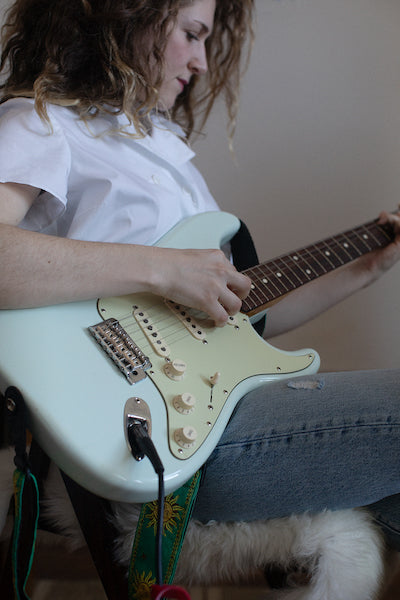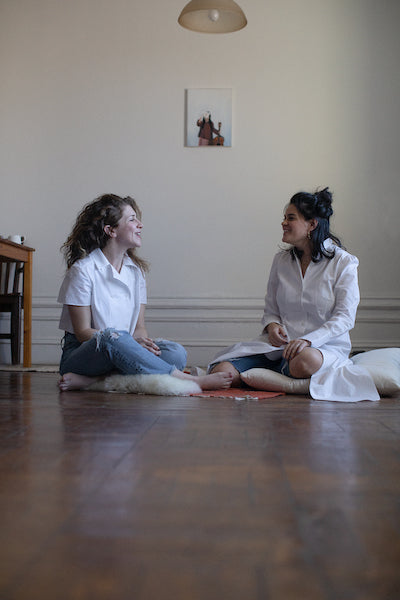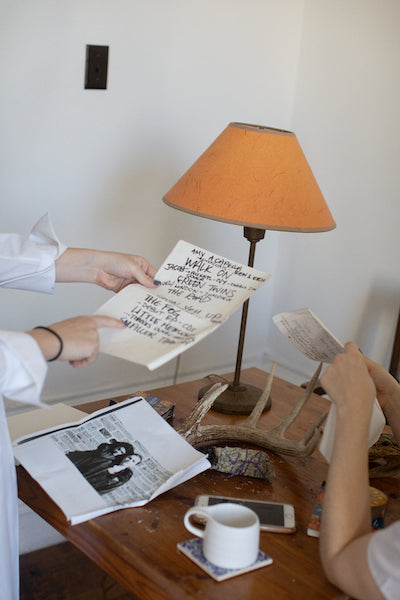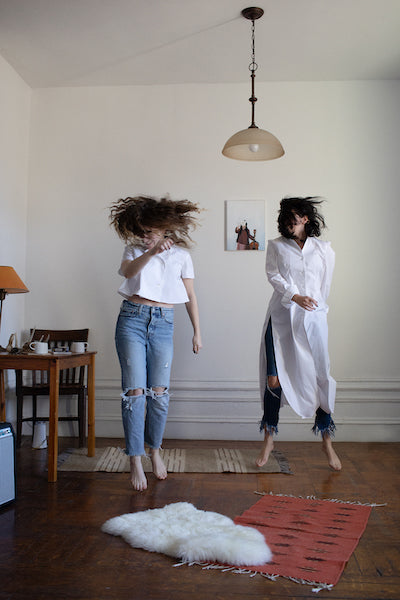Althea: JJ, you were saying earlier that you had never really performed in public before Overcoats, and you had written songs but never shared them with anyone. So Hana, what was your experience with music before starting the band?
Hana: I was always interested in playing instruments; I picked up guitar and piano at an early age and I tried a bunch of other instruments in college. I played Banjo and the harp and I've always liked the tactile experience of playing and also singing. But in terms of writing, I had never showed anyone – that was pretty private – until I met JJ. Prior to JJ, I had been in this acapella group and I had liked doing chorus and things like that, but in terms of making it an artistic pursuit, I was too shy for that. Until I met JJ.
A: You met in college; I would love to hear about the acapella group you were in together.
JJ: It was great for many reasons, such as learning about harmonies and having a dedicated time every couple of days when you're singing in a group of women. That's amazing on principle, but it can get kind of crazy. There were some diva vibes. But it meant that Hana and I were singing together every week for four years, which helped lock things in sonically.
A: So that's where you realized that you had basically the same voice and could blend and sing in unison and have it sound crazy?
H: It's funny because our voices when we sing individually are actually quite different. But from the get-go when we first sang together, even prior to the acapella group, we would just be singing for fun, in the dorm bathroom, just anywhere…
A: Were you on the same hall freshman year?
H: Yeah. I think from the get-go when we sang together it just felt really good. Then as we did it for longer and longer and honed in on our blend, we started to see that we have the ability to create one voice and that was really attractive to us. We were like, ‘this is way more fun than singing by yourself.’
J: It's like Yin and Yang. Yin is not the same as Yang. They're different colors and they're opposites of each other in a sense. But together they make one whole that fits together perfectly. And I feel like that's our voices.
A: I’ve also heard you describe it as peanut butter and jelly, which I think is apt. Did your acapella days get you used to performing in public?
J: I’m still not used to that.
H: I would even say it had the adverse effect of making us terrified of it, because it wasn't the most enjoyable thing to perform a capella. It's so quiet because you're not amplified; it’s really scary.
J: We actually had to do most of our getting-over-stage-fright in the years afterwards. I don't think I felt comfortable performing until we had played 150 shows.
H: We used to get hives. During acapella, I'd have to wear tall shirts because I actually would get hives every time.
J: It only ended recently. Now the rest of our lives are such a mess that the only comfortable place is on stage, like: ‘Finally! Here's something I actually know how to do!’ Unlike the rest of being an adult.
A: It's kind of amazing that you guys continued performing even though it gave you hives.
J: Pushing through that period was really difficult.
H: We had to find what worked for us. A lot of people have a beer on stage or something. We don't drink at all. We try to just face it head on and I think it's been good for us in the long run.
J: Also movement, endorphins. We used to stand there straight as an arrow singing into the microphone. Now we jump around and have fun because it's like, why not?
H: One of our mottoes that we would say to each other right before we went on stage was “remember your arms,” because we just wouldn’t use them. We'd say “good luck out there. Love you. Remember your arms.”
J: And now I need to be, like, muzzled, or in a straightjacket. But that definitely helps, movement just makes you feel better. If I'm putting myself out there anyway – in front of hundreds of people – I may as well have a good time. If they're going to think something about me then so be it.
A: They're going to think something about you no matter what.
J: Whether I have arms or not.













